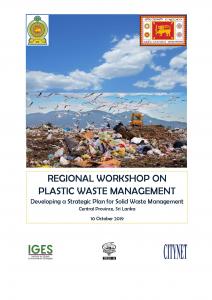Solid waste has become a common and challenging issue all over Sri Lanka. Still, the country is trying to find an appropriate solution to minimizing the threat created by solid waste to the country’s environment. Huge investments and uncountable awareness programs have done very little to the expectations of the waste management process in the country. It is an obvious fact that the generation of waste is gradually increasing and the solutions applied so far have not been able to manage the issues created by the increasing volume of waste.
It has been recorded that in the Central Province of Sri Lanka, the waste management process has become a critical problem due to several limitations including geographical reasons being the most prominent. Its geographical limitations have created impacts more on air, water, and soil pollution and compounding of all these issues have grown the problems to unmanageable proportion. Especially, the air pollution in Kandy Town has been recorded at the highest level due to the city being located in a valley surrounded by mountain ranges from all the directions. In addition to that, most of the water sources which are originated from the mountains of Central Province are being threatened due to pollution caused by indiscriminate dumping of waste. Therefore, the increasing environmental pollution created by improper waste management should be tackled with appropriate strategies and more participatory approaches.
Although the waste management process in the Central Province is becoming a more challenging issue for the authorities as well as for the people there is no collective effort to formulate strategies for addressing this issue. However, evidence shows that there are some best practices in the country as well as in Asia – Pacific Region by involving the relevant stakeholders in Municipal Solid Waste Management which could be considered for application in our context. Proper identification of possible inputs/engagement from different stakeholders to address specific aspects of Solid Waste would help in achieving collective responsibility to manage the Solid Waste problems in the Province. In this context, waste generators and collectors can play a vital role in managing a considerable proportion of the large waste problem in a city or region. The consultation carried out under the IGES Centre Collaborating with UNEP on Environmental Technologies (CCET), United Nations Environment Programme (UNEP) International Environmental Technology Centre (IETC), CITYNET project. It has been found that there is lack of coordination between the waste generators and waste collectors. In this regard, HELP-O, CCET, UNEP IETC and CITYNET were planning to discuss with relevant stakeholders about the importance of networking and coordination among stakeholders in waste management including private sector as well as importance of strategic plan in waste management for local governments. The aim of above discussion was also to create a common platform to share expert knowledge and create networking to manage the available resources for sustainable solutions in the waste management sector through Public-Private Partnerships. As the initial step, the Governors’ Office of Central province and the local authorities with the technical assistance of HELP-O, CCET, UNEP IETC and CITYNET organized a valuable workshop with the vision to make “Clean Central Country and Proud Nations” in Central province in Sri Lanka.

